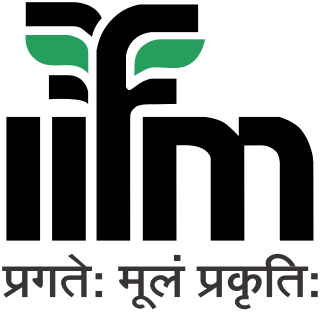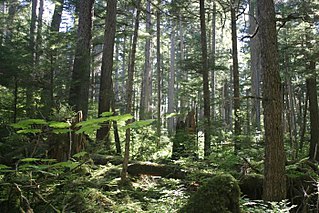
The Center for International Forestry Research (CIFOR) is a non-profit scientific research organization that conducts research on the use and management of forests with a focus on tropical forests in developing countries. CIFOR is the forestry research center of the Consultative Group on International Agricultural Research (CGIAR), a network of 15 research centers around the world that focus on agricultural research for sustainable development, working closely with governments and other partners to help develop evidence-based solutions to problems related to sustainable agriculture and natural resource management.
Adaptive management (AM), also known as adaptive resource management (ARM) or adaptive environmental assessment and management (AEAM), is a structured, iterative process of robust decision making in the face of uncertainty, with an aim to reducing uncertainty over time via system monitoring. In this way, decision making simultaneously meets one or more resource management objectives and, either passively or actively, accrues information needed to improve future management. Adaptive management is a tool which should be used not only to change a system, but also to learn about the system. Because adaptive management is based on a learning process, it improves long-run management outcomes. The challenge in using the adaptive management approach lies in finding the correct balance between gaining knowledge to improve management in the future and achieving the best short-term outcome based on current knowledge. This approach has more recently been employed in implementing international development programs.

Forestry laws govern activities in designated forest lands, most commonly with respect to forest management and timber harvesting. Ancillary laws may regulate forest land acquisition and prescribed burn practices. Forest management laws generally adopt management policies, such as multiple use and sustained yield, by which public forest resources are to be managed. Governmental agencies are generally responsible for planning and implementing forestry laws on public forest lands, and may be involved in forest inventory, planning, and conservation, and oversight of timber sales. Broader initiatives may seek to slow or reverse deforestation.

The Indian Institute of Forest Management (IIFM) is an autonomous, public institute of sectoral management located in Bhopal, Madhya Pradesh, India, established by the Ministry of Environment, Forest and Climate Change, Government of India with financial assistance from the Swedish International Development Cooperation Agency (SIDA) and course assistance from the Indian Institute of Management Ahmedabad. The institute's objective is to fulfill the growing need for the managerial human resource in the area of Forest, Environment, and Natural resources Management and allied sectors. The institute is headed by a director selected and appointed by the Ministry of Environment, Forest and Climate Change, Government of India.
The International Union of Forest Research Organizations (IUFRO) is a non-profit, non-governmental international network of forest scientists, headquartered in Austria.

Elinor Claire "Lin" Ostrom was an American political economist whose work was associated with the New Institutional Economics and the resurgence of political economy. In 2009, she was awarded the Nobel Memorial Prize in Economic Sciences for her "analysis of economic governance, especially the commons", which she shared with Oliver E. Williamson. To date, she remains the only woman to win the Nobel Prize in Economics.
The Foundation for Ecological Security (FES) is a registered non-profit organisation based in Anand, Gujarat, India working towards the ecological restoration and conservation of land and water resources in ecologically fragile, degraded and marginalised regions of the country, through concentrated and collective efforts of village communities.

An "Important Common Forest" in India is a forest governed by local communities in a way compatible with sustainable development. Such forests are typically called village forests or panchayat forests, reflecting the fact that the administration and resource use of the forest occurs at the village and panchayat levels. Hamlets, villages and communities of villages may actually administer such a forest. Such community forests are usually administered by a locally elected body, usually called the Forest Protection Committee, Village Forest Committee or the Village Forest Institution. Such committees are known as Van Panchayats in the Kumaon Division of Uttarakhand, Forest Co-operative Societies in Himachal Pradesh and Van Samrakshan Samitis in Andhra Pradesh. Legislation pertaining to communal forests vary from state to state, but typically the state government retains some administrative control over matters like staff appointment, and penalization of offenders. Such forests typically conform to the IUCN Category VI Protected Areas, but protection may be enforced by the local communities or the government depending on local legislation. Maharashtra is the state with the most forest land while Haryana has the least.

Natural resource management refers to the management of natural resources such as land, water, soil, plants and animals, with a particular focus on how management affects the quality of life for both present and future generations (stewardship).

The United Nations Forum on Forests (UNFF) is a high-level intergovernmental policy forum. The forum includes all United Nations Member States and Permanent Observers, the UNFF Secretariat, the Collaborative Partnership on Forests, Regional Organizations and Processes and Major Groups.
The Yale Center for Environmental Law & Policy is a joint initiative between the Yale School of Forestry & Environmental Studies and the Yale Law School.
Sustainability metrics and indices are measures of sustainability, and attempt to quantify beyond the generic concept. Though there are disagreements among those from different disciplines, these disciplines and international organizations have each offered measures or indicators of how to measure the concept.

The Rights and Resources Initiative (RRI) is a non-governmental organization working to encourage forest tenure and policy reforms and the transformation of the forest economy so that business reflects local development agendas and supports local livelihoods. RRI works at the country, regional and global levels, collaborating on research, advocacy and convening strategic actors.

Community forestry is an evolving branch of forestry whereby the local community plays a significant role in forest management and land use decision making by themselves in the facilitating support of government as well as change agents. It involves the participation and collaboration of various stakeholders including community, government and non-government organisations (NGOs). The level of involvement of each of these groups is dependent on the specific community forest project, the management system in use and the region. It gained prominence in the mid-1970s and examples of community forestry can now be seen in many countries including Nepal, Indonesia, Korea, Brazil, India and North America.
A social-ecological system consists of 'a bio-geo-physical' unit and its associated social actors and institutions. Social-ecological systems are complex and adaptive and delimited by spatial or functional boundaries surrounding particular ecosystems and their context problems.
The Institutional Analysis and Development framework (IAD) was developed by Elinor Ostrom, an American political scientist, also known as the first woman to receive the Nobel Memorial Prize in Economic Sciences in 2009. The IAD relates a set of concepts to help in the analysis of collective action problems that involve social structures, positions, and rules. Under the rational choice models, the IAD was devised in an attempt to explain and predict outcomes by formalising the structures, positions, and rules involved in collective choice problems. Thus, it can be seen as a systematic method to collect policy analysis functions similar to analytic technique commonly used in physical and social sciences and understand how institutions operate and change over a period of time.
Integrated landscape management is a way of managing a landscape that brings together multiple stakeholders, who collaborate to integrate policy and practice for their different land use objectives, with the purpose of achieving sustainable landscapes.
The Landscape Conservation Cooperatives (LCC) are a network of 22 regional conservation bodies covering the entire United States and adjacent areas, established in 2009. They are autonomous cooperatives sponsored by the U.S. Department of the Interior, and aim to develop coordinated conservation strategies applicable to large landscape areas. Partnerships are formed with governmental and non-governmental conservation organisations. Similar initiatives have been started or advocated in other parts of the world.
Paige Fischer is an environmental scientist from the Pacific Northwest whose research focuses mainly on the human dimensions of environmental changes. She is especially interested in forest ecology and conservation. She is currently an Assistant Professor at the University of Michigan's School for Environment and Sustainability, teaching upper level classes about analysis methods and social vulnerability to climate change.















